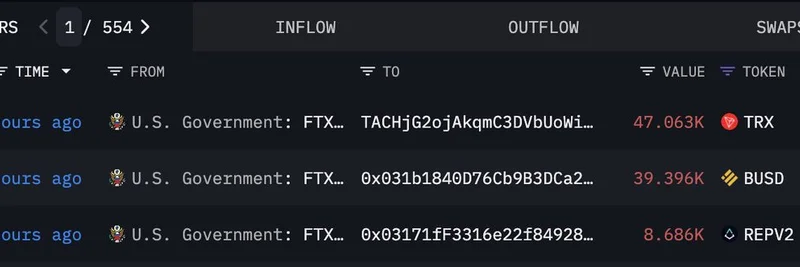In the ever-evolving world of cryptocurrency, big moves by governments can send ripples through the market. Recently, the US Government made headlines by shifting some of the assets it seized from the collapsed FTX exchange and its sister firm, Alameda Research. This isn't the first time they've handled these funds, but each transfer sparks curiosity about what's next for these recovered tokens.
According to a fresh update from Onchain Lens on X, in just the last three hours, the government moved:
- 47,063 TRX (Tron tokens), valued at around $13.77K
- 39,396 BUSD (Binance USD stablecoins)
- 8,686 REPV2 (Augur's Reputation tokens), worth about $12.77K
These weren't random shuffles—they went to brand-new addresses, suggesting careful management or preparation for future actions like liquidation or redistribution.
Why This Matters in Crypto
For those new to the scene, FTX was once a giant in the crypto exchange world, but it imploded in late 2022 amid fraud allegations against founder Sam Bankman-Fried. The US Government stepped in, seizing billions in assets to cover losses for victims. Transfers like these are part of the ongoing process to handle those funds responsibly.
TRX is the native token of the Tron blockchain, often used for fast, low-cost transactions. BUSD is a stablecoin pegged to the US dollar, issued by Paxos in partnership with Binance—though it's been phased out recently. REPV2 comes from Augur, a decentralized prediction market platform where users bet on real-world events.
While these amounts might seem small compared to the total seized (which runs into billions), they highlight the government's active role in crypto oversight. For meme token enthusiasts, this serves as a reminder of the risks in the space—exchanges can fail, but blockchain transparency lets us track every move.
Potential Implications for Meme Tokens and Beyond
Meme coins thrive on hype and community, but they're not immune to broader market forces. Events like FTX's fallout shook investor confidence across the board, leading to stricter regulations that could impact how meme projects launch and trade. If the government starts liquidating larger chunks of seized assets, it might influence token prices or liquidity in related ecosystems.
Tron, for instance, hosts plenty of meme activity due to its cheap fees. Any government sales could indirectly affect those markets. Keep an eye on on-chain analytics tools—they're your best friend for spotting these shifts early.
Stay tuned to Meme Insider for more updates on how traditional finance intersects with the wild world of memes and blockchain. If you're diving into meme tokens, always do your due diligence and consider the bigger picture.
Key Takeaways
- Transparency in Action: Blockchain lets anyone verify these transfers, promoting trust in a decentralized system.
- Market Watch: Small moves today could signal bigger ones tomorrow—watch for patterns in government wallet activity.
- Learning Opportunity: Use this as a chance to explore tools like Etherscan or TronScan for tracking addresses yourself.
For the full details, check out the original post on X. What's your take on these government moves? Share in the comments below!




